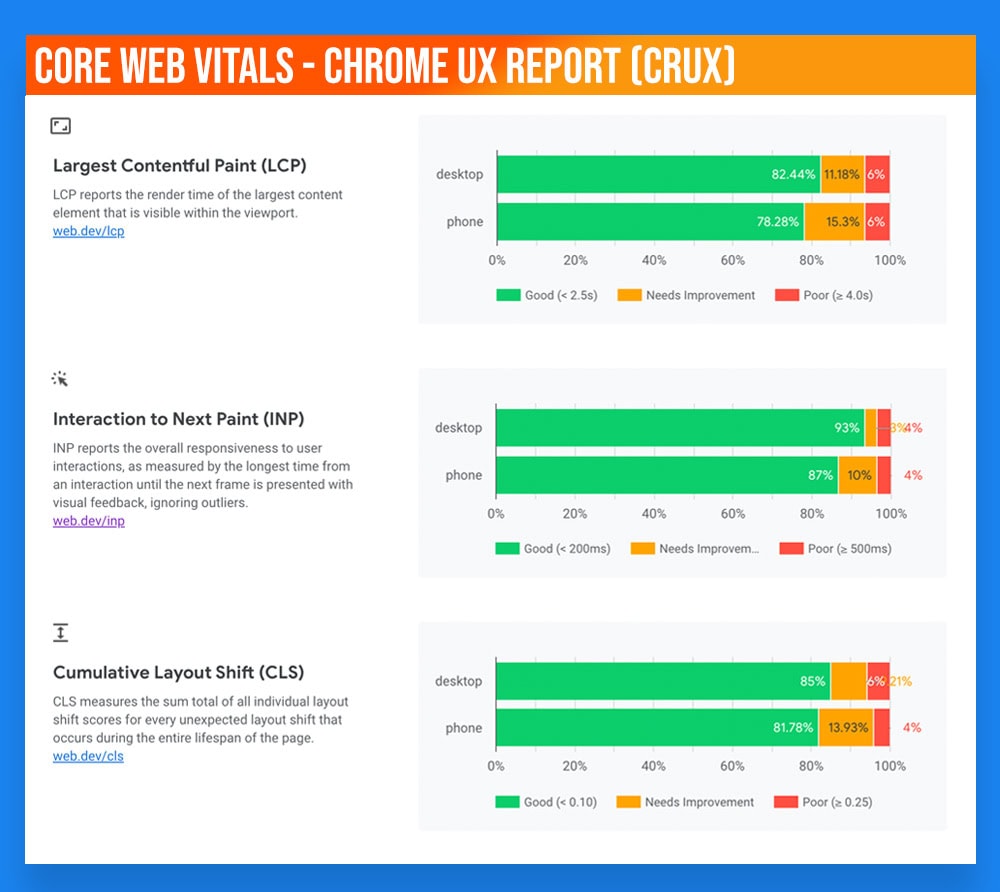A seamless online presence is crucial for any legal brand, and ensuring your law firm’s website meets Google’s Core Web Vitals (CWV) is essential for maintaining a strong online presence. CWV is a set of metrics that measure how responsive and user-friendly your website is during a visitor’s experience. Here’s an introduction to these metrics and how they can impact your law firm’s digital marketing strategy.
What are Core Web Vitals?
Core Web Vitals consist of three main metrics:
- Largest Contentful Paint (LCP). LCP measures how quickly the largest element on a page loads. This could be a hero image, video, or text block, and it influences how quickly users can view your site.
- Interaction to Next Paint (INP). INP measures the amount of time it takes for a website to respond to a user-initiated event like a click, tap, or key press.
- Cumulative Layout Shift (CLS). CLS assesses the visual stability of a page, measuring unexpected layout shifts that can disrupt user experience.

What are Group Scores?
The Group LCP, Group INP, and Group CLS are the measurements scored by 75% of the visits to the URL. Webpages are scored as Good, Need Improvement, or Poor. Once they are scored for LCP, INP, and CLS, they are grouped into pages with similar scores. This is called URL Grouping.
| Good | Needs Improvement | Poor | |
|---|---|---|---|
| LCP | <= 2.5s | <= 4s | > 4s |
| INP | <= 200ms | <= 500ms | > 500ms |
| CLS | <= 0.1 | <= 0.25 | > 0.25 |
How Do Core Web Vitals Affect Your Law Firm’s Ranking?
While CWV is just one of many factors Google considers when ranking websites, it plays a significant role in user experience. Websites that fail to meet CWV standards may experience higher bounce rates and lower engagement, ultimately impacting their search engine rankings, especially for medium to large-traffic sites.
Common Reasons for Failing Core Web Vitals
Several factors can lead to poor CWV performance:
- Server performance. Cheap, shared hosting can lead to slow loading times and instability during traffic spikes. Upgrading to managed hosting or a virtual private server (VPS), an isolated virtual environment on a physical server can improve flexibility, scalability, and overall performance significantly.
- Unoptimized content. Large, unoptimized images and videos can slow down page load times. Optimize media and implement lazy loading to improve site speed. Lazy loading is a web design technique that waits for the user to reach a certain part of a webpage to load content, particularly images. Lazy loading is an alternative to eager loading, where everything loads all at once.
- Third-party scripts and plugins. Excessive use of plugins or poorly optimized scripts can also degrade performance. Update plugins regularly and minimize unnecessary scripts.
- Content Delivery Network (CDN.) Utilizing a CDN can enhance performance by delivering content from servers closer to users, reducing latency and improving load times. In addition, a CDN can improve website performance by storing cached versions of the website in data centers across the country, which can be especially beneficial for national law firms. This allows webpage content to be delivered to the end-user from a geographically relevant server.

Tips for Finding a Quality Web Server
Cheap, budget servers may not have the speed and power to deliver your law firm’s website to the user. Budget web hosts place dozens of websites on a single server; any traffic spikes or malicious attacks on these websites will also affect your website's performance and stability. Larger firms may opt for a dedicated server, and small and mid-size firms may choose VPS or cloud-based managed hosting.
Hosting types include:
- Shared Hosting: The most cost-effective option for low-traffic websites.
- Managed Hosting: Ideal for non-technical users who’d rather defer the more technical tasks to experts.
- VPS Hosting: This is the best option for websites that have outgrown shared hosting.
- Cloud Hosting: Works best for websites that are growing rapidly and need scalable resources.
- Dedicated Hosting: This is a more expensive option for large websites where you need to be in control.
- Colocation Hosting: The most expensive option that gives you maximum control over the hardware and software.
Checking and Improving Your Core Web Vitals
Law firms can monitor CWV performance through Google Search Console under the Experience tab. Addressing issues promptly and validating fixes ensures your website provides a seamless user experience.
After fixing any CWV issues, you can validate the fix inside the search console. Validation is evaluated over 28 days before being considered fixed. If any issues occur within the 28-day days, the affected web pages will fail validation.
Are Your Core Web Vitals Up to Speed?
By prioritizing Core Web Vitals, law firms can enhance user satisfaction, reduce bounce rates, and potentially improve search engine rankings. Simple optimizations such as choosing the right hosting, optimizing media, and minimizing third-party scripts can make a significant difference.
Ready to optimize your law firm’s website for better performance? Contact Legal Communications Group to learn more about our SEO services and how we can help improve your Core Web Vitals. Your future clients deserve a fast and reliable online experience—let’s make it happen together.







